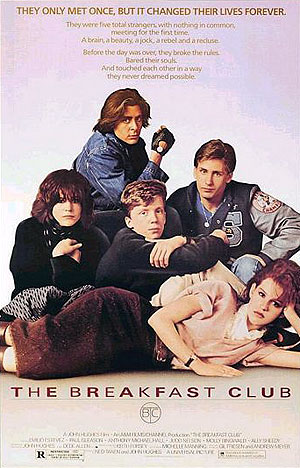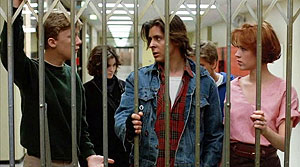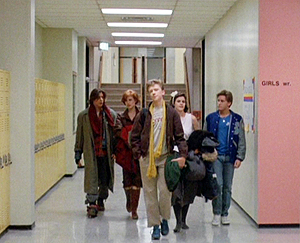
The Breakfast Club

THE BREAKFAST CLUB (MOVIE)
Universal Pictures
Original release: February 15th, 1985
Running time: 93 minutes
Writer and director: John Hughes
Cast: Emilio Estevez, Judd Nelson, Paul Gleason, Molly Ringwald, Anthony Michael Hall, Ally Sheedy

My time at high school was nothing anyone would really want to make a film about or write a book on. For the most part it was uneventful and for the years I was there, I was glad to keep it that way. Together with mounting pressures each year over final exams and the ongoing popularity contests, it was a place where I felt it was best to just go unnoticed, keep my head down and just get on with it. Besides, I had too much going on at home to add more to my plate of troubles. Looking back on those times I regret having this point of view. Bumping into former classmates in the decades that followed, I came to realise only too late that I wasn’t the only one who felt that way.
It turned out that some people I had formed opinions about but never took the time or effort to get to know, because of my own insecurities, were just like me – trying to get through what was actually some of the most confusing times of their lives and we could’ve all done with a few more good friends on our side, instead of the ones we’d grouped together in cliques with.
Such was high school life and something that might’ve pointed that out to me back then was this 80’s high school movie from John Hughes. The Breakfast Club begins on a Saturday morning with a group of students arriving for detention in the school library where they’re about to spend the next eight hours and fifty-four minutes together. Andrew (Emilio Estevez), Allison (Ally Sheedy), Claire (Molly Ringwald), John (Judd Nelson) and Brian (Anthony Michael Hall)  are all from different backgrounds, and they’ve all categorised each other without realising they all share things in common; the universal distance between themselves and their parents, as well as the underlining fear they’ll grow up and become just like them.
are all from different backgrounds, and they’ve all categorised each other without realising they all share things in common; the universal distance between themselves and their parents, as well as the underlining fear they’ll grow up and become just like them.
As the hours pass, the initial hostilities they had toward each other start to wane and they eventually see this, though they know that back at school on Monday morning they’ll return to ignoring each other. Still, these few hours together gives them an opportunity to let down their guard and be as individuals without pretence, fear or worry that they’ll be thought less of for baring their home truths.
Amidst the scenes of rebellion and youthful rejoicement as these five misfits let loose all their frustrations and anger, Hughes also peppers the film with an infectious soundtrack that captures the mid-80’s zeitgeist perfectly. Most memorable of all is Simple Minds’ Don’t You (Forget About Me) which is heard toward the end as John walks across the football filed and defiantly raises his fist to the air.
What The Breakfast Club also drew my attention to was that it’s not just the kids who form and enforce these stereotypes, but also the authority figures. They too are guilty of wanting to neatly categorise individuals without giving them an opportunity to first of all figure out who they are.  This is perhaps best remembered in the film when Brian completes the detention assignment for the group and reads it out.
This is perhaps best remembered in the film when Brian completes the detention assignment for the group and reads it out.
It makes me think back to my own days and ask myself why I didn’t get as much out of the high school experience as I could’ve. Maybe because I kept my head down so much that I never ended up in detention or anywhere else where I could learn something that wasn’t in a textbook. At it’s heart though, The Breakfast Club isn’t a film that categorises and stereotypes people; it’s a film more about how we do it and how others do it to us and I guess that’s why I connected so well with it; because I’d done it too.

Patrick Samuel
The founder of Static Mass Emporium and one of its Editors in Chief is an emerging artist with a philosophy degree, working primarily with pastels and graphite pencils, but he also enjoys experimenting with water colours, acrylics, glass and oil paints.
Being on the autistic spectrum with Asperger’s Syndrome, he is stimulated by bold, contrasting colours, intricate details, multiple textures, and varying shades of light and dark. Patrick's work extends to sound and video, and when not drawing or painting, he can be found working on projects he shares online with his followers.
Patrick returned to drawing and painting after a prolonged break in December 2016 as part of his daily art therapy, and is now making the transition to being a full-time artist. As a spokesperson for autism awareness, he also gives talks and presentations on the benefits of creative therapy.
Static Mass is where he lives his passion for film and writing about it. A fan of film classics, documentaries and science fiction, Patrick prefers films with an impeccable way of storytelling that reflect on the human condition.
© 2022 STATIC MASS EMPORIUM . All Rights Reserved. Powered by METATEMPUS | creative.timeless.personal. | DISCLAIMER, TERMS & CONDITIONS
HOME | ABOUT | CONTACT | TWITTER | GOOGLE+ | FACEBOOK | TUMBLR | YOUTUBE | RSS FEED
CINEMA REVIEWS | BLU-RAY & DVD | THE EMPORIUM | DOCUMENTARIES | WORLD CINEMA | CULT MOVIES | INDIAN CINEMA | EARLY CINEMA
MOVIE CLASSICS | DECONSTRUCTING CINEMA | SOUNDTRACKS | INTERVIEWS | THE DIRECTOR’S CHAIR | JAPANESE CINEMA





